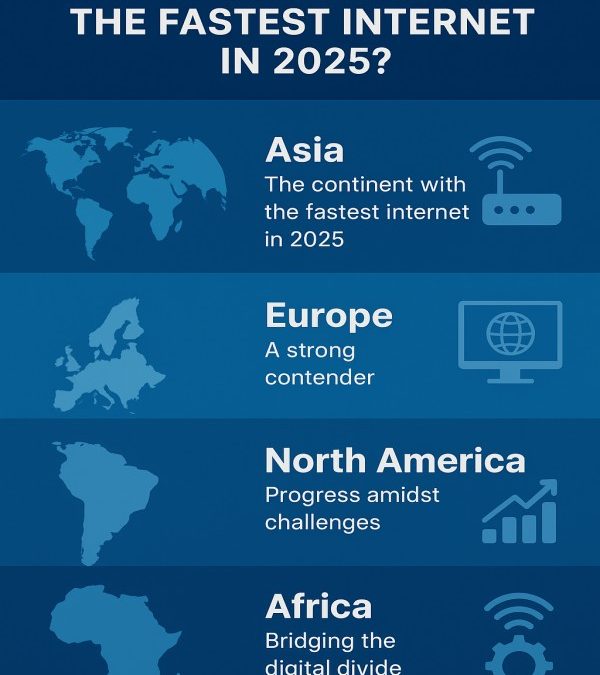Which Continent Has the Fastest Internet in 2025?
In 2025, internet connectivity continues to evolve rapidly, with varying speeds across different continents. Asia stands out as the continent with the fastest internet, driven by significant infrastructure investments, technological advancements, and high-speed broadband adoption.
Asia: The Global Leader in Internet Speed
Asia leads the world in internet speeds, particularly in countries like Singapore, the United Arab Emirates (UAE), and Hong Kong. Singapore boasts the fastest fixed broadband speeds globally, averaging 345.33 Mbps, thanks to its advanced fiber-optic infrastructure and strategic investments in digital connectivity.
The UAE follows closely with an average broadband speed of 313.55 Mbps and excels in mobile internet, achieving speeds of 543.91 Mbps. Hong Kong ranks third with 312.48 Mbps, benefiting from dense urban connectivity and robust digital infrastructure.
Other Asian countries, such as South Korea and Japan, also contribute to the continent’s leadership in internet speeds. South Korea ranks eighth globally with average broadband speeds of 173.95 Mbps, while Japan has achieved groundbreaking speeds in experimental settings, setting a new world record by transmitting over 125,000 gigabytes of data per second across a distance of 1,120 miles.
Europe: A Strong Contender
Europe maintains a strong presence in global internet speed rankings, with several countries offering high-speed broadband. France, for instance, has an average download speed of 290.75 Mbps, supported by extensive fiber-optic networks and strategic digital policies.
Iceland also stands out with an average speed of 295.55 Mbps, attributed to its widespread adoption of fiber-optic connections and a relatively small, tech-savvy population. Other European nations like Denmark and Switzerland offer competitive speeds, with Denmark averaging 254.75 Mbps and Switzerland 245.39 Mbps.
North America: Progress Amidst Challenges
North America, particularly the United States, has made significant strides in internet speed. The U.S. ranks seventh globally with a median fixed broadband speed of 289.34 Mbps. However, challenges remain in ensuring equitable access to high-speed internet, especially in rural and underserved areas.
Canada follows with a median speed of 240.34 Mbps, reflecting its ongoing efforts to expand broadband infrastructure across the country.
South America: Emerging Growth
South America is experiencing rapid growth in internet speeds, with Chile leading the region. Chile’s average broadband speed is 279.53 Mbps, positioning it as a regional leader in digital connectivity
Brazil, with a median speed of 210.56 Mbps, also shows promise, driven by increasing fiber-optic deployments and a growing digital economy.
Africa: Bridging the Digital Divide
Africa faces challenges in internet speed and accessibility, with many regions still lacking robust infrastructure. However, countries like Kenya and Nigeria are making strides in improving connectivity through investments in mobile broadband and satellite internet services.
Ethiopia, for instance, has over 28 million internet users as of 2025, with expanding mobile broadband penetration, although challenges remain in rural access, speed, and affordability.
Global Internet Speed Rankings (Top 5 Countries)
| Rank | Country | Average Broadband Speed (Mbps) |
|---|---|---|
| 1 | Singapore | 345.33 |
| 2 | United Arab Emirates | 313.55 |
| 3 | Hong Kong | 312.48 |
| 4 | Iceland | 295.55 |
| 5 | France | 290.75 |
Asia stands at the forefront of global internet connectivity in 2025, with countries like Singapore, the UAE, and Hong Kong leading in both fixed broadband and mobile internet speeds. Europe follows closely, with nations like France and Iceland offering competitive speeds. North America continues to make progress, while South America and Africa are emerging as regions of growth and development in digital connectivity.
As technology continues to advance, these rankings are subject to change, and ongoing investments in infrastructure and innovation will be key drivers in shaping the future of global internet speeds.
